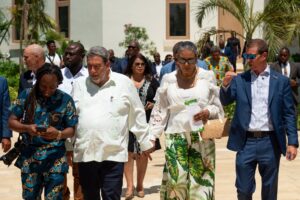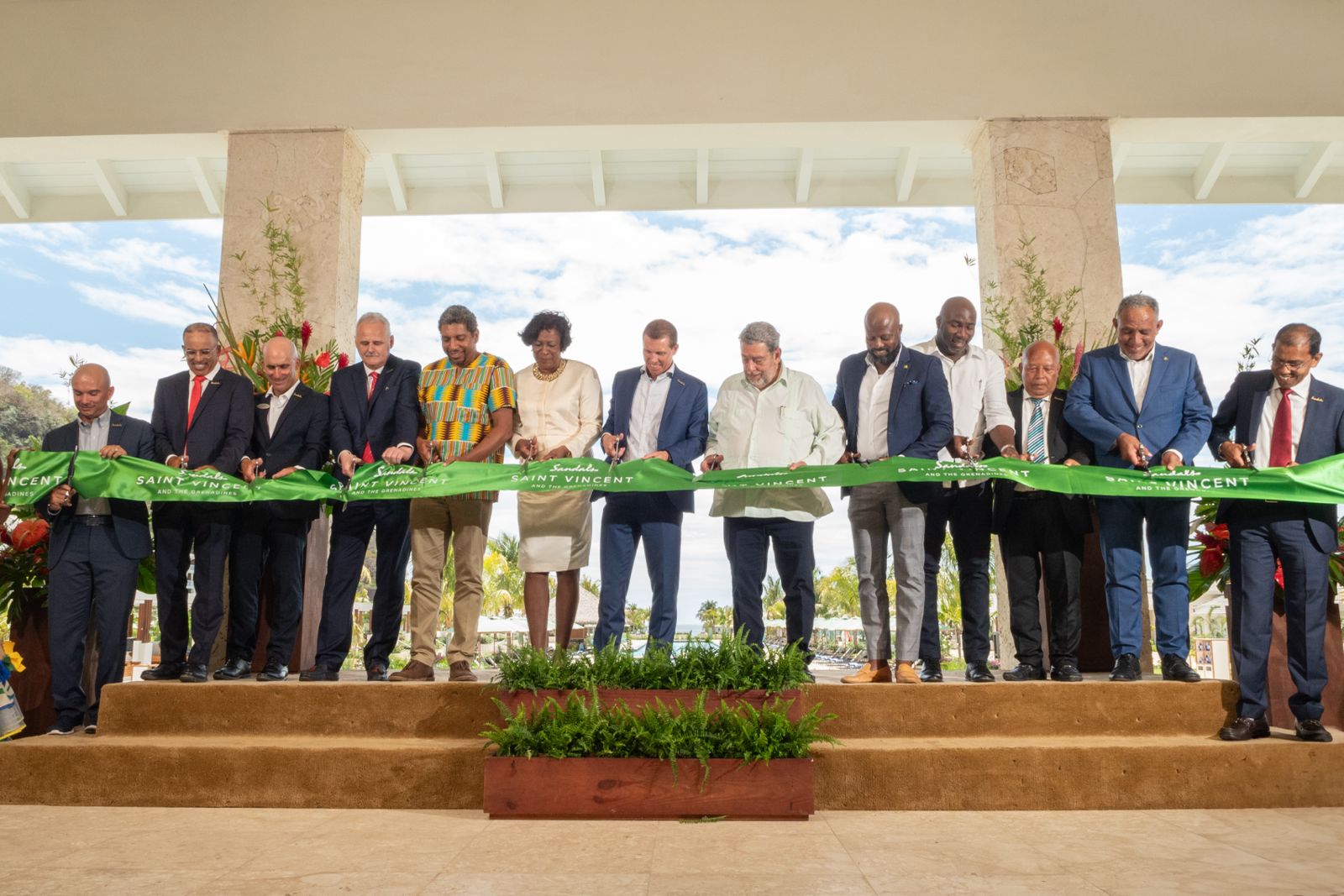~SANDALS® RESORTS OPENS ITS 18TH RESORT IN SAINT VINCENT AND THE GRENADINES~
April 17, 2024, Montego Bay, Jamaica – In an intimate ribbon cutting ceremony commemorating Sandals Resorts’ entry into the largely undiscovered destination of Saint Vincent and the Grenadines, the only Caribbean born superbrand welcomed its first guests to a nature-forward experience brimming with island inspiration and stirring ‘Sandals Firsts’.
Witnessed by government officials, Sandals executives, guests and resort team members, an emerald green ribbon, representative of the island’s flag and lush surroundings, was cut signaling the official opening of Sandals Saint Vincent and the Grenadines.
Executive Chairman of Sandals Resorts International Adam Stewart, spoke on what the opening of the hotel chain’s 18th resort meant for the brand, the island and the Caribbean at large. “This is a multi-generational act in the making that began with my extraordinary father Gordon ‘Butch’ Stewart and Prime Minister Gonsalves many years ago. They flirted heavily about flying the Vincy flag not only here but in all the other islands across the Caribbean that Sandals has its operations. Little did we know that 43 years later the Sandals brand would grow from one 99-room hotel in Montego Bay to a top 500 brand known on the world stage as a super brand. The only Caribbean born commercial super brand known across the United States, Europe and Canada with over 84% brand penetration and recognition,” he shared.
father Gordon ‘Butch’ Stewart and Prime Minister Gonsalves many years ago. They flirted heavily about flying the Vincy flag not only here but in all the other islands across the Caribbean that Sandals has its operations. Little did we know that 43 years later the Sandals brand would grow from one 99-room hotel in Montego Bay to a top 500 brand known on the world stage as a super brand. The only Caribbean born commercial super brand known across the United States, Europe and Canada with over 84% brand penetration and recognition,” he shared.
He expounded further on what he dubbed the Sandals Effect, a confluence of things that happen when Sandals comes to town. “First and foremost, we market the destination, both St. Vincent and the Grenadines. The landscape that makes up this incredible archipelago will benefit. Directly and indirectly for linkages, tour operators, taxi operators, restaurateurs, musicians, farmers, fishers, entrepreneurs, hardware store operators, the entire ecosystem and connectivity we plan to make sure that the entire world knows.”
With Sandals’ expansion to the island, airlift has increased exponentially with more availability on the horizon. According to Adam Stewart, numerous airlines have adjusted their schedules in anticipation for the demand. “American Airlines used to fly twice per week to and from the Argyle Airport, since April the airline has increase to four times per week and is expected to have daily flights by the end of 2024. Air Canada and Virgin have increased their airlift with JetBlue and United Airlines now flying to the island for the first time. Nationals and visitors will have the opportunity to fly more conveniently and we will continue to grow. ,” expressed Stewart.
The resort, in May 2024, is expected to host some 300 top travel advisors from around the world, the largest contingent of international travel professionals to ever visit Saint Vincent and the Grenadines.
Dr. The Honourable, Ralph Gonsalves, Prime Minister of Saint Vincent and the Grenadines, in his main address added further credence to the impact Sandals has on his country and the CARICOM community. “During COVID, unemployment went up, there was a decline in economic activity in the region. At the time we also had volcanic eruptions, Sandals came to us with a proposal to recruit Vincentians and send them to their resorts across the Caribbean to be trained. We had to evacuate 20,000 persons with some in shelters for four to six months. Along came a friend in Sandals who said they could ease some of the pressure providing opportunities for 500 people and these little things talk to me about partnership. This might have been small for Sandals but it was a huge thing for us in the condition in which we found ourselves and I want to thank Sandals and Adam.”
us in the condition in which we found ourselves and I want to thank Sandals and Adam.”
“It is an understatement really to call Sandals a brand. It has become an existential part of our Caribbean civilization. This civilization is tailor-made for tourism and Butch Stewart has helped to shape this aspect of the material to help sustain us. I think that when the history of the 20th into the 21st century is written, there would be a towering place for this legend,” The Hon. Gonsalves continued.
In honour of the late Gordon ‘Butch’ Stewart, Prime Gonsalves in opining that the relationship he enjoyed with the late founder made him “one of us” shared a remarkable plan to celebrate his memory and contributions to tourism and economic development in the region. “The government of Saint Vincent and the Grenadines had indicated to Sandals that we will build the road coming to the entrance of the hotel. Having built it, we will call it the Gordon ‘Butch’ Stewart Boulevard,” the Prime Minister announced proudly to stirring applause from the audience.
Sandals Saint Vincent and the Grenadines offers 301 rooms and suites across 50 lush-laden acres, authentically embracing its Saint Vincent location with an experience that is as thoughtful as it is meticulously local.


 Caribbean News1 week ago
Caribbean News1 week ago
 Caribbean News7 days ago
Caribbean News7 days ago
 Caribbean News1 week ago
Caribbean News1 week ago
 Caribbean News1 week ago
Caribbean News1 week ago
 Bahamas News7 days ago
Bahamas News7 days ago
 News7 days ago
News7 days ago
 Bahamas News1 week ago
Bahamas News1 week ago
 News7 days ago
News7 days ago












